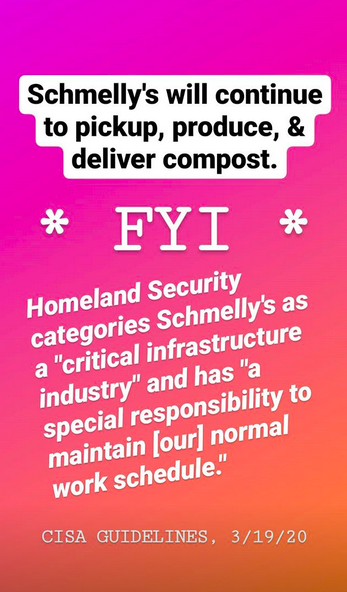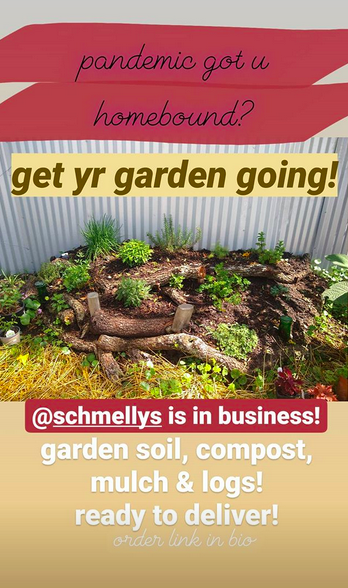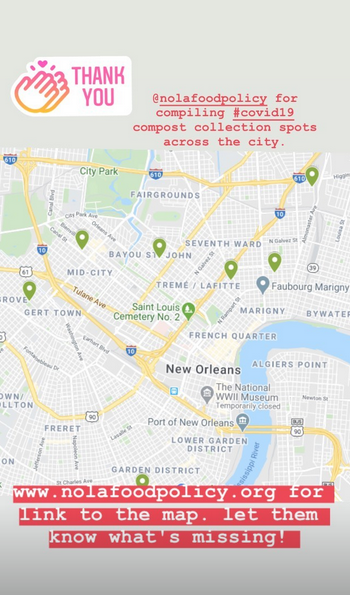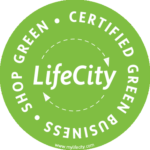A crisis for growth
This reflection on COVID-19, the local food system response, and composting as an essential service was written by Nico Krebill, Schmelly’s worker/owner, appears in our Spring 2020 Newsletter. To sign up for our quarterly newsletter, please visit here.
This has been one of the most challenging, confusing, busiest times of my life. There is no roadmap, no good guidance, no understanding… except for the confidence that comes from stillness, patience, and watching a plant grow.
At the start of March, Schmelly’s picked up organics* from over 50 businesses, mostly restaurants and other food service locals like caterers and hotels. We have doubled our business growth every year since 2014. Starting March 11th, we began to see the first messages for cancellation of service, initially from The Roosevelt Hotel and the Superdome/Centerplate, letting us know that they were cutting spending in the prediction that they would be losing business for a month or two. Tourists were cancelling reservations, and arena events were being postponed till summer. I told my coworkers that things didn’t look good on the horizon: our reliable monthly revenue stream was at risk and their hours may get reduced if we saw a mass cancellation from our clients. In less than a month’s time, we saw over 40 of our clients close their doors and cancel their compost pickup contracts.

On March 19th, the Department of Homeland Security wrote a public memo stating, “If you work in a critical infrastructure industry, such as healthcare services and pharmaceutical and food supply, you have a special responsibility to maintain your normal work schedule.” Schmelly’s is an organics recycling business, picking up organics residuals from the food industry and closing the loop by recycling that natural material into compost, a rich soil conditioner for farmers and gardeners. Your food system relies on compost. Schmelly’s is, by definition, part food/agriculture industry and part public works/waste management.
What would our city be like without us? If we stopped picking up, where would the organic waste go?
And so, we continue to pick up organics from one grocery store and a handful of to-go cafes and restaurants. Organics recycling is an essential service and venturing out into the world during a covid pandemic is frightening. Three Schmelly’s workers have opted to stay at home to lower the risk of spreading the virus. Two of my other co-workers and I have, with cautious unknowing, continued organics collection work. At the grocery store, a police officer working private security detail points an infrared thermometer at our foreheads to check if we have a fever. We wear masks in our truck and repeatedly slather hand sanitizer into our palms. We occasionally wipe down surfaces with disinfectant. I opted to continue the business of organics recycling because I couldn’t envision what our society would do if essential services like ours stopped.
There was also a knot in my stomach about who is left to do the essential services work. To me, it felt like a luxury to stay home and rely on others to do essential work. I asked myself, who is doing the essential work and how is it decided who these workers are? Is there a hierarchy to who gets to comfortably shelter in place, and who finds themselves without that option? Why are the historically vulnerable and marginalized in society finding themselves at greater risk of contracting this virus?
With constant big and small questions running through my mind, I have not been sleeping well at night.
* * *
A Renewed Hope
As we lost our organics collection clients, something else happened. It was spring and those residents sheltering-in-place were eager for home activities and new, safer options for bringing food to the table. In the last few years, we’ve had a simple request form on our website where farmers and gardeners can request compost and garden soil. We always saw an uptick at the beginning of spring and fall, when planting is at its prime. And we offer a service that’s hard to find in this city: home delivery of any quantity of rich, fertile garden soil, delivered right into your garden bed if you so desire.

By April, about a full month into the covid19 crisis, our simple website request form blew up. We had over a hundred orders for compost & soil. I quickly trained two of my sheltering-in-place co-workers to handle incoming sales requests and maintain spreadsheets of data so we could manage orders. Customers wanted to drive their Priuses to our site for 3 cubic yards of soil, defying all laws of physics. We needed customer service. We needed a shift of gears, a new approach to our business.
After 2 month of crisis, we’ve fulfilled over 200 orders for garden soil & compost. We transformed our stockpile of compost microorganisms into a deliverable opportunity for urban agriculture. It has felt near impossible to run a business in a collapsed economy, especially in a city that thrives on food & hospitality. Yet my hope is renewed each time I see the beaming smile on a gardener’s face as they get their garden soil. It has been a privilege to continue to serve the food growers of this city.
We have also been inspired by so many of our local food system partners. With the Compost NOW library program closed, the Food Policy Advisory Committee has published an interactive map of neighborhood compost drop-off sites. Sprout NOLA and Anna Timmerman from LSU Ag Extension have been distributing free seeds and seedlings to new growers in collaboration with Grow Dat Youth Farm and River Queen Greens. Refresh Market and Top Box have teamed up to source a Crescent City Farmers Market box of all local produce. People across the city are collaborating, innovating, and working together to address the inequities in our food system.
Thank you.
__________________
* (FYI “Organics” is broad term which includes anything from a plant or animal, typically food scraps, and commonly called compost. Since the word “compost” is used for both the raw material at the start of the composting process as well as the final product at the end of the process, we like to use the word “organics” to distinguish the initial starting material that feeds our compost piles, the stuff we collect as a composting company.)


